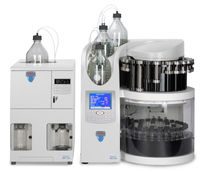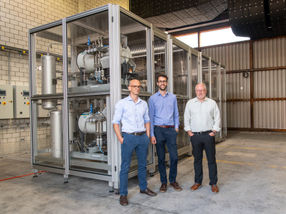European joint venture for C3-based oxo chemicals:
Degussa and Celanese welcome EU Commission approval
Degussa AG of Dusseldorf, Germany, and Celanese AG of Kronberg, Germany, today received European Commission approval for the proposed joint venture between the two companies' European propylene-based oxo businesses. Both companies welcome this decision. The new company will be named European Oxo chemicals GmbH and will be incorporated in Oberhausen, Germany. Degussa and Celanese will begin with the integration of the two businesses and with the preparations for the start-up of the new company as soon as possible. They will each hold a 50 % share in the joint venture.
Prof. Utz-Hellmuth Felcht, Chairman of the Degussa Management Board, said: "The joint venture creates the necessary conditions for the promising further development of our propylene-based oxo chemical activities."
Claudio Sonder, Chief Executive Officer of Celanese AG, said: "The joint venture is an important milestone in our efforts to find future-oriented solutions for our Chemical Intermediates' businesses."
Celanese and Degussa will combine the European propylene-based oxo production, technology, marketing and distribution activities of Celanese in Oberhausen and of Degussa's subsidiary Oxeno GmbH in Marl, Germany.
Oxo chemicals are mainly used as chemical intermediates, solvents and softening agents. On a pro-forma basis, the joint venture would have generated sales of approx. EUR450 million with around 240 employees in 2002.
Most read news
Organizations
These products might interest you

ERBAdry by CARLO ERBA Reagents
Anhydrous solvents from CARLO ERBA Reagents in a clever redesign
ERBAdry series impresses with the latest generation of septa and sealing caps

Thermo Scientific™ Dionex™ ASE™ 150 or 350 Accelerated Solvent Extractor systems by Thermo Fisher Scientific
Accelerated Solvent Extraction (ASE) – Maximize results and reduce errors in food analysis!
More extractions in less time using less solvent

Get the chemical industry in your inbox
By submitting this form you agree that LUMITOS AG will send you the newsletter(s) selected above by email. Your data will not be passed on to third parties. Your data will be stored and processed in accordance with our data protection regulations. LUMITOS may contact you by email for the purpose of advertising or market and opinion surveys. You can revoke your consent at any time without giving reasons to LUMITOS AG, Ernst-Augustin-Str. 2, 12489 Berlin, Germany or by e-mail at revoke@lumitos.com with effect for the future. In addition, each email contains a link to unsubscribe from the corresponding newsletter.









































